|
Some days ago we had the opportunity to talk with the Composer Ramin Djawadi about his last work for the videogame Medal of Honor.
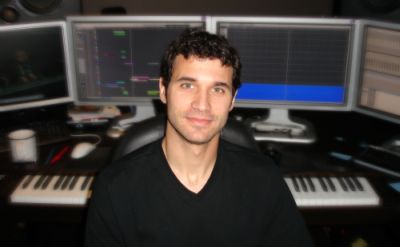 Ramin was very kind and answered all of our questions. He also told us about his work method and his previous scores. He is a very nice guy. Here you have the interview. Ramin was very kind and answered all of our questions. He also told us about his work method and his previous scores. He is a very nice guy. Here you have the interview.
BSO Spirit: Hi Ramin, this is Jose Luis from Spain.
Ramin: Hi, how are you?
BSO Spirit: Fine, thanks. How about you?
Ramin: Very good, thank you.
BSO Spirit: It’s a pleasure to talk to you.
Ramin: Thank you for your interest in talking to me.
BSO Spirit: It’s Amazing. You’ve got a lot of fans in Spain.
Ramin: Oh really? Glad to hear, I’m so glad to hear. Awesome.
BSO Spirit: Ok, I think you don’t have a lot of time so let’s go to the point. You know, just as briefly introduction, bsospirit.com the best film music web site of Spanish. We usually make interviews for many composers. So, let’s begin running. Only with one general question and alter that going to the point about your last work for Medal of Honor. So the first question is how do you get interested in making music for the audiovisual industry?
Ramin: it’s audiovisual just in general film music?
BSO Spirit: Yes absolutely.
Ramin: You know, it’s interesting that happened when I was a young kid because I, as other composers, started with music very early, I played guitar. It turned out that all the music I was always writing was instrumental so it really led itself for me to write music for films. Movies like The Magnificent Seven and Star Wars, of course, have influenced me so much and all have something I would love to pursue. So I knew very early on, maybe it was in seventh grade when I decided I wanted to do film music.
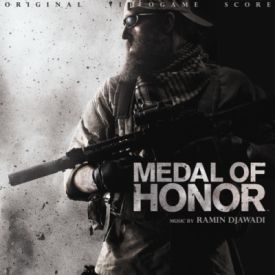 BSO Spirit: Ok. So, let’s focus on your last job and if after that we have enough time we’ll come back to your past. Let’s focus on Medal of Honor, how did you get involve in this project? BSO Spirit: Ok. So, let’s focus on your last job and if after that we have enough time we’ll come back to your past. Let’s focus on Medal of Honor, how did you get involve in this project?
Ramin: You know, sometimes things happen by pure coincidence. I was actually at a friend birthday party and I met somebody there from EA and we started talking and she asked me “have you ever done a videogame before” and I answered “Honestly I haven’t and I actually love to play videogames so I would love to do a game.” And she said, “So we should work together” and that’s how started. Then I had a meeting with EA, and then we were looking for a Project and then Medal of Honor seemed to be the right fit. So that’s how all came together.
BSO Spirit: Ok. In this new title from the EA franchise, World War II is no longer the setting for the story. We’re now in Afghanistan, in present time. Has this change somehow affected to the music and how?
Ramin: You know, I guess the whole Franchise is going through this reboot right now so musically we knew also we wanted a complete fresh start and of course it affected it was in a present time, in a complete different location and, you know, we started over and we looked at it from a modern perspective and everything the locations, the themes, we always thought how we make this to look different.
BSO Spirit: Were you familiar with this franchise? I mean were you familiar with the Michael Giacchino and Christopher Lennertz scores for these videogames?
Ramin: Oh, I was, yeah. I’m a big fan of the game itself and of course of both theirs scores are incredible so I’m a big fan and I’m very proud to now be part of the Medal of Honor family, the franchise and the family of composers.
BSO Spirit: Do you usually play videogames?
Ramin: If I had the time actually I will. I don’t play as much anymore as I used to when I was younger. I played a lot. I’m a big gaming fan actually.
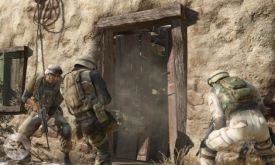 BSO Spirit: This is your first collaboration in a videogame soundtrack. Do you think that this industry is in a constant growing evolution? BSO Spirit: This is your first collaboration in a videogame soundtrack. Do you think that this industry is in a constant growing evolution?
Ramin: Absolutely. Yeah, I mean, if you think back even just ten years or fifteen years, from a technical point of view, how you could integrate music into a game was very limited in terms of sound and also in terms of size. So it had to be compressed. So if you think back of old videogames you always have that idea of electronic sound and all that. And now it has completely changed, there are a lot of more stores based on DVDs the games come on so now you’re able to treat it like a movie, you can do the big the sound you want, if you want full orchestra, anything. So, it makes very complex and very exciting to work on that evolvement, the evolution of it.
BSO Spirit: Some senior composers like John Debney and many others are now beginning to work in videogames. Do you think that eventually more and more composers will begin to work in this kind of projects?
Ramin: I would say so, yeah. The crossover is really happening across the board. I mean, you see film composers that only did features are now doing TV, or TV composers are doing Films. The same with videogames. As you also know Hans just did his first videogame as well.
BSO Spirit: Yeah.
Ramin: Like I said also in the other question, the fact is so complex now, I mean, it’s basically the same as working in a movie in a way of the size of the score, the amount of minutes and all of that. So I can see that more and more will be interested in doing that.
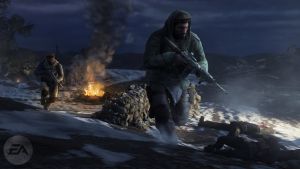 BSO Spirit: Just talk briefly about Hans Zimmer. Hans Zimmer has worked in the soundtrack for Call Of Duty: Modern Warfare 2, one of the most profit videogames in the multimedia history and likely the pattern followed in the creation of this new Medal of Honor title. Has Hans give you some kind of advise for writing your soundtrack? BSO Spirit: Just talk briefly about Hans Zimmer. Hans Zimmer has worked in the soundtrack for Call Of Duty: Modern Warfare 2, one of the most profit videogames in the multimedia history and likely the pattern followed in the creation of this new Medal of Honor title. Has Hans give you some kind of advise for writing your soundtrack?
Ramin: Actually, not at all. We were working at the same time and a funny thing is that at the beginning we didn’t know that we were both doing a game; so even though we’re in the same building here obviously sometimes he is writing in his room and I’m writing in mine and we don’t always know what the other is up to. And when we found out that we both were working in a videogame we were actually joking about “Don’t look to my music” or “you can’t see what I’m doing”, joking and hiding from each other. We worked at the same time but his game came out last year.
BSO Spirit: So, how did you begin to work with the Hans Zimmer studio, Remote Control, formerly known as Mediaventures?
Ramin: It was like many other things, pure coincidence again. Just through a friend of a friend I got my chance to be in the door here and a connection and I moved to Los Angeles, asked to join the team here. I started as an assistant basically, just doing arrangements and then slowly worked my way out of the letter. I worked with Hans in several movies, like “Pirates of the Caribbean” and “Batman Begins” and slowly got my own projects. Hans has been an amazing amazing mentor and now he’s a great friend. I admire him very much and I’ll always be thankful for everything he has taught me.
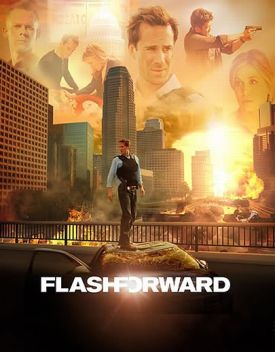 BSO Spirit: Before working in the Prison Break’s score, you wrote a couple of scores for tv-shows that were finally cancelled, as “Blade” and “Threshold”. The same thing happened recently with another show, “Flash Forward”. How deal a Composer with the cancellation of a show he is working on? BSO Spirit: Before working in the Prison Break’s score, you wrote a couple of scores for tv-shows that were finally cancelled, as “Blade” and “Threshold”. The same thing happened recently with another show, “Flash Forward”. How deal a Composer with the cancellation of a show he is working on?
Ramin: How do I feel about?
BSO Spirit: How do you feel or deal with it?
Ramin: Obviously I wasn’t very happy, because on a TV show you spent a lot of time on the pilot, you know setting up the tone, the themes, and you have like an outlook of where you want to go with the score as the season goes on and hopefully with the season two and three. Prison Break is a great example of how I could over four seasons just take it all of it through and have a grand finale at the end. With Flash Forward we were cut short and it’s a great show but whatever reasons it gets cancelled, maybe obviously we didn’t have enough of an audience. It was very sad because I felt there were a lot of themes in there that can be developed further. It was sad.
BSO Spirit: Absolutely, absolutely. And then fortunately came “Prison Break”, and your name starts to be known in the audiovisual industry. How did you get involved in this particular show?
Ramin: I think I got a call from my agent, actually. He said there is a show called Prison Break, a very good show, there is a meeting. And so I did. I met the producers and we had a good meeting. I wrote a theme and we stylistically seem to be in the same page and they really liked what I was doing. I get numbered also very fast I think that when I was brought on aboard, I think I had two and a half weeks until the show was going to be on air.
BSO Spirit: My Goodness, I can’t believe it.
Ramin: It was quite a test. Jump in and custom a main title, you have to do the main title and this is a lot.
BSO Spirit: My Goodness. Your score for this show was very frenzy, with a lot of presence of electronic music. How did you decide that this was the right approach or music texture the show needed?
Ramin: Are you back to Medal of Honor now?
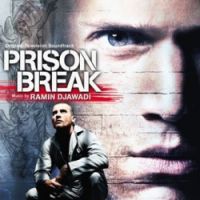 BSO Spirit: We’re still with Prison Break, sorry about that. BSO Spirit: We’re still with Prison Break, sorry about that.
Ramin: I don’t know. I think it was part of the conversations with the producers of how we wanted to approach it. And I think we decided we wanted a lot of presence of electronics but we used also a big orchestra in moments when you can take it. The show was so epic I think that’s why it could handle such a thing. There was a lot of fun to work on that.
BSO Spirit: Which film you would you say it’s your favorite one?
Ramin: Humm. That’s always a tough question. I….I…I didn’t, I didn’t. It’s rare but I don’t know if I have one. You know what I like from being a film composer is that every movie is different. And with every movie you have to seek for new sounds and new approach. Like Mr. Brooks I went all Electronics, and with Iron Man we have orchestra and guitars and with Clash of the Titans we have big orchestra so I don’t know if I can think of my favorite film.
BSO Spirit: You will know that here in Spain, a big number of fans consider “Mr. Brooks” one of your best scores. Do you have some special memories from this work?
Ramin: Yeah. You know it was very wonderful since I worked very closely with Kevin Costner who was also the producer on this movie. He would come over and spent a lot of time with the score. A lot of time these scores have a certain identity because the director or the producer have an idea or just how they want a character to be or a Hollywood movie to be and Kevin had always that idea of this great duality of the character, on the one hand he wanted him to be this badass killer and on the other hand this normal family man. So that was this great split we could do between this normal emotional family man and also this very sophisticated killer so we can make it very cool. That’s a great memory that I have of working with Kevin, talking about the themes, when he said “that’s cool” or “you do this electronically here.”
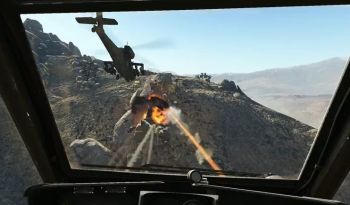 BSO Spirit: So coming back to present time, talking about Medal of Honor game. Do you think you will continue to work in this franchise, Medal of Honor? What would you say today, ha ha? BSO Spirit: So coming back to present time, talking about Medal of Honor game. Do you think you will continue to work in this franchise, Medal of Honor? What would you say today, ha ha?
Ramin: Well, it’s hard to say. I certainly enjoyed working with EA. I guess anything can happen in the future. I don’t know. I really enjoyed working with EA and working in a videogame so I could see myself doing more in the future, yeah.
BSO Spirit: How much time gave you Electronic Arts to write this soundtrack?
Ramin: It was a lot of time. I would say I had more than a year.
BSO Spirit: Wow!
Ramin: Yeah. I got involved very early, which was great. When I met with them they show me some early footage and artwork and I just decided to get involved early since I was interested in the evolving of the game and to be part of that as the levels came together.
I didn’t work continuously over the year. I would work on running themes and on several pieces and then I would do other projects also in-between. So that’s a great schedule since it allows me to support a big workload. The whole game kind of came together in about a year.
BSO Spirit: When you write soundtracks, which is your favorite instrument?
Ramin: Most of the times I write on the piano or on the keyboard just because that’s how we create the demos and today everything is done on the computers. However sometimes I do a little bit different and with this game actually it’s been part of it, because most of the cues are based on solo instruments. So I could only do so much with the keyboard and with the samples and playing demos but I worked a lot with solo musicians, percussionists and then I would create layers and throughout of the year I would be doing a lot of recordings and then create the tracks like that.
BSO Spirit: Do you want to add anything else for the Spanish fans?
Ramin: Actually, I’m just very excited when you told me that there are a lot of people in Spain that like my music and follow my scores. I’m very excited to hear that, I’m really love that. Thank you very much.
BSO Spirit: Thank you for this interview!
Interview by Jose Luis Diez Chellini
Questions by David Doncel and Oscar Rivas.
|





